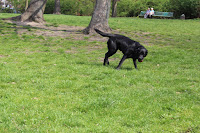 |
| Kimchi Princess |
When I started the blog almost five years ago, I decided to name it "Currywurst and Sushi", to give a flavour of Berlin: a city characterised by an ever-present history with an international flair.
At the time I decided that currywurst and sushi would do the job. However, if I were to rename the blog today, I would probably call it "Currywurst and Kimchi".
 |
| Bottom-right Bibimbap; second row in the middle Kimchi |
Like Spargel, you might wonder: what is so special about Kimchi? After all, one may argue that it's a spicy version of Sauerkraut.
- Sauerkraut... isn't that a traditional German dish? (I hear you asking)
- Spicy? I thought Germans didn't like spicy food...
True, but this is not Germany, this is hipster capital Berlin.
Every few months or so a new trend emerges. Some of these trends survive (street food or gourmet burgers), while others are quickly forgotten (bubble tea). It will be interesting to see whether this new wave of Korean restaurants that have taken over the city will last.
Personally I think it will, because Kimchi is actually really tasty and so is Korean food. So bring on the Kimchi and forget the Spargel! Or even better try combining Spargel with Kimchi. I think I might be on to a winner...
Where to eat Kimchi in Berlin
Kimchi Princess: very popular with hipsters
Skalizer Str. 36, 10999 Berlin Kreuzberg
Kochu Karu: Korean-Spanish fusion cuisine
Eberswalderstr. 35, 10437 Berlin Prenzlauer Berg
Omoni: very good sushi & Korean food including Kimchi
Kopenhagener Str. 14, 10437 Berlin Prenzlauer Berg




